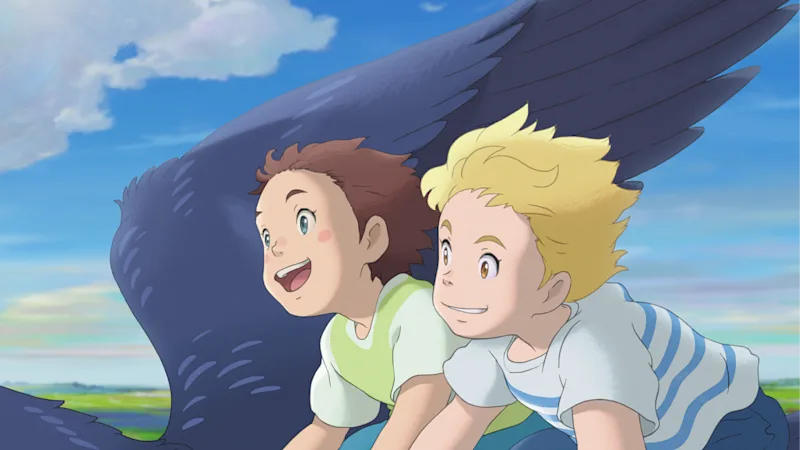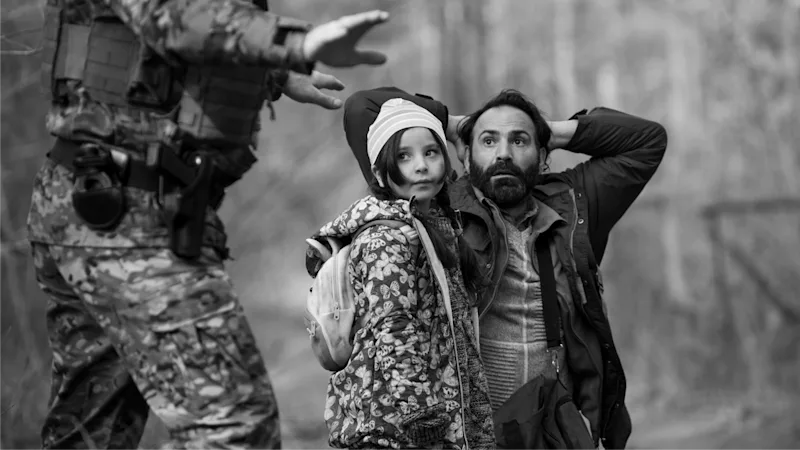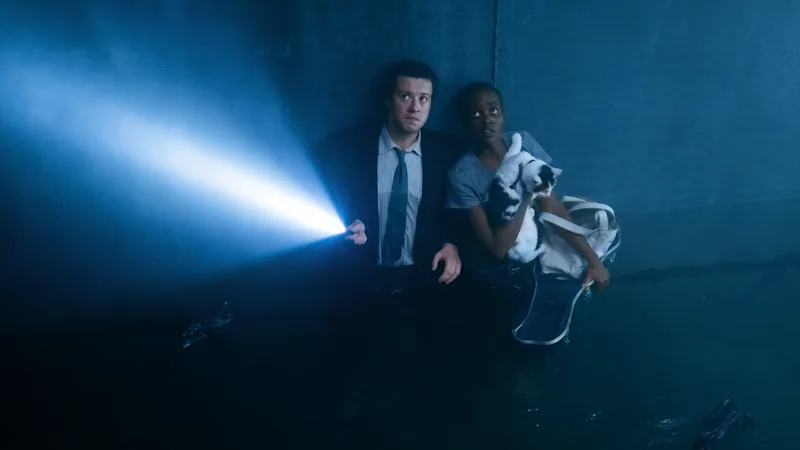The road to getting The Bikeriders made has been a long one. Jeff Nichols had been wanting to direct the film, a period drama about the rise and fall of a Chicago motorcycle club throughout the 1960s, since he first cracked open Danny Lyon's eponymous photography book more than two decades ago. Published in 1968, the book is a chronicle of the Chicago Outlaws Motorcycle Club, told via black-and-white photos and interviews that Lyons conducted with the club's members over multiple years. For Nichols, it painted "a beautiful portrait of an American subculture."
"Danny did this amazing job of getting everyone he interviewed to open up," he explains. "You really start to hear how the people in it think, and you understand why they're drawn to each other, why they feel like they don't fit in within mainstream society, why they feel better in the club, and why they identify as members of it."
Actually adapting such unconventional source material into a feature forced Nichols to break the rules and conventions he'd long held as a filmmaker. "I thought the book presented a chance to talk about a very real human quality, which is how attracted we are to things that are dangerous to us," the writer-director, whose previous films include 2011's Take Shelter and 2013's Mud, says.
His Bikeriders is, like the book that inspired it, an expansive look at the romance, rebellion, and eccentric personalities that emerged during a very specific period of 20th century America. The film centers on a fictional Chicagoland biker club, the Vandals, and comes to revolve around a love triangle between the club's leader Johnny (Tom Hardy), his right-hand man Benny (Austin Butler), and Benny's girlfriend Kathy (Jodie Comer). Kathy narrates the film through interviews conducted by Danny Lyon, as played by Mike Faist.
Nichols' journey with The Bikeriders has been defined by unexpected stops and starts along the way, including losing its initial distributor and release date. (It was eventually picked up by Focus Features.) Now, the film finally arrives in theaters, and Nichols is as eager as ever to see how audiences engage with the question at the heart of the movie: Why are we drawn to things that can hurt us? "I still don't know," he confesses to A.frame. "The film doesn't really answer that question, but it certainly asks it."
A.frame: Your last film, Loving, was released in 2016. Why the eight-year break?
Jeff Nichols: It was just the way life unfolded. It didn't stem from any secret desire to become Terrence Malick. [Laughs] Coming off of Loving, Fox approached me about doing a big sci-fi film [a reboot of 1988's Alien Nation], and I spent three years on that. Then Disney acquired Fox and didn't want to move forward with it. To be honest, I don't think of myself as the most strategic filmmaker — I tend to put all my eggs in one basket — and we'd gotten to about the one-yard line with that project, so it was especially heartbreaking when it was dropped. When that happens, you sort of look around and think, "Okay, I need to make some money. I need to make a movie." The problem was that I didn't have anything written, so I immediately took on a couple of projects.
The first was Yankee Comandante, which I still very much want to make and is based on a David Grann article from 2012 that was published by The New Yorker. It's about the Cuban Revolution, and I spent a long time working on that. We were going to take it out in March of 2020, which… turned out not to be a great time to do that. [Laughs] I was also writing The Bikeriders around that time, and then I got a call from John Krasinski about trying my hand at a prequel to A Quiet Place. When he offered me that, I thought, "Hell, this might be the only movie that can get made in a pandemic!" So, I spent six months working on it. That didn't pan out, though, so I went back to The Bikeriders and, before I knew it, it was 2022 and we were coming out of the pandemic.
I approached New Regency with the script for Bikeriders without any cast members attached, and they still said yes. By the fall of that year, we were making it. When you add all the time I spent working on other projects, the timeline makes sense. I don't know if it's a particularly interesting story, but there is a reason why it took this long!
The first half of the film feels loose and anecdotal, while the second half tells a much more linear story. As you were adapting Danny's book, what was your approach to finding the balance between those different modes of storytelling?
It was a really difficult thing to figure out. How do you keep people entertained without telling a traditional story in a traditional manner? I had a great film to reference in Goodfellas, because if you look at the first hour of that movie, it is not plotted in any traditional way. Really, what it's doing throughout that first hour is making you fall in love with the romantic side of a very dangerous subculture, so I really studied that film in terms of its structure. There were all these great little anecdotes in Danny's book — that's basically what the book is — so I asked myself, "Can I get away with the first half of the film just being these romantic and compelling anecdotes? Can I structure this completely differently than I've ever structured a film before?" Usually, my movies are very structurally reserved. There's no jumping around in time or voice-over. Usually, everything's very linear.
So, I was really breaking all of these rules that I had set for myself, aesthetically, in all of my other films. Almost every scene in The Bikeriders has pre-lapped dialogue that leads into the next, so it all starts to feel almost like a giant trailer. Hopefully, it's fun to watch. It really is filled with what I think are movie moments — moments that you'll hopefully walk out of the theater and remember. A turn did have to happen at some point, though, and this love triangle between Jodie, Austin, and Tom's characters starts to take over. That's supported by the broader narrative of the club shifting over the course of a decade and metastasizing into a proper gang, and if you look at the aesthetic of the film, that gear shift really does come at the halfway point. All of a sudden, there's less narration and less non-diegetic music. Suddenly, the songs start to come out of jukeboxes rather than playing over everything. That's not necessarily a hard and fast rule that I stuck to — there are still a couple of scenes in the second half where I use non-diegetic needle drops — but like you said, the whole tone of the film does shift around its midpoint.

You can even feel that shift in the performances that Jodie, Austin and Tom give.
Definitely, and that's because the film starts to embrace reality. It's like the book in that sense. You open it up and, at first, you're captivated by all these beautiful photographs, and then you get to the middle of it and there are all these interviews and they're unvarnished, frustrating, complex, and sometimes cruel. The movie feels that way, too. We have have to wake up to reality — to the reality of this lifestyle that these characters have chosen for themselves.
As you were putting the film's ensemble together, were there certain actors you knew from the start that you wanted to play certain part?
Mike [Shannon] was the only one I really knew, but I knew the other actors were out there. I knew I wanted Mike to play Zipco, because I had heard some of the original audio of Danny's interviews with Zipco and he sounded like Michael Shannon. I also knew I had these two great monologues for Zipco, and I just couldn't wait to see Mike deliver those. I knew that he would make them even better, because he makes everything better. But his casting ended up being really impactful to the overall film.
I remember, specifically, when we shot his second monologue, which we did during the first week of filming; it's this scene where he's sitting around a campfire talking about his experience with the draft board. Mike and I don't really rehearse. We don't talk a lot before we start shooting, because he's so damn smart that he always has everything pretty well figured out on his own. He doesn't really need to hear anything from me. But before we started filming that scene, Mike came up to me and he said, "Nichols, you think this is pretty funny, don't you?" I said, "Yeah, I do. Your mom gets you out of bed and drags you to the draft board, and you fail all the tests and you yell at the draft guys. It seems pretty funny to me." The way Mike curses in that scene is, for the record, incredible. But I said that to Mike and he responded, "Yeah, I don't think it's funny at all." I was taken aback a bit, but I said, "Well, all right, Mike. Show me what you think this really should look like."
So he delivers this monologue, and everyone's sitting around the campfire with him: Tom, Jodie, Austin, Norman [Reedus], Karl [Glusman], Damon [Herriman], Beau [Knapp], Emery [Cohen], and Boyd [Holbrook]. The whole gang's literally there, and they all get to listen to Mike Shannon do this amazing thing where he starts to tell a joke and he gets everybody laughing, and then he flips it and says, "They told me, 'You're an undesirable character. We don't want you.'" All of a sudden, everybody stopped laughing, because of the way Mike delivered that line. I never interpreted that line the way he says it. I didn't even write it. It came directly from Danny's book, and Mike could have thrown it away before we shot it. If he had, the scene would carry a lot less weight. But what he was doing in that scene was really building out the psychology of all of these guys. They felt undesirable. They felt unwanted. And that's why they ended up together.
You could say that about the whole movie. The shift into a more solemn and elegiac space wouldn't be so effective if you didn't start from a more fun and knowingly goofy place.
Yeah, and there's some super-affected stuff in the first half of the movie. The whole first 20 minutes is just a setup for one joke, but that section also establishes a romance and love between Austin and Jodie's characters, which we need for the rest of the movie to work. The style and aesthetic of that section is also really important, because it makes everyone fall in love with the club's lifestyle. It's not reality, though. The music of the Shangri-Las washing over everything as motorcycles drive onto a bridge at night isn't reality. That doesn't happen. But I sure do love watching that scene.

I know that Tom didn't tell you what his accent was going to be in the film before he arrived on set. As a filmmaker, do you find it easy to trust your actors to handle such big character choices without your input?
The funny thing about Tom's character, Johnny, is that we didn't have a vocal reference we could use from the making of the book. We had one for Kathy. We had one for Zipco. We even had ones for Cal, Brucie, and Cockroach. The speech that Cockroach gives about eating a raw beef sandwich was pulled directly from a recording of the real guy. We didn't have recordings for either Johnny or Benny, though, so both Austin and Tom were left to their own devices. As a director, I really think you have to dance with the one you bring, you know? You have to have faith in your actors. You have to trust that you hired them for a reason and that they're as smart as you think they are, and it always turns out that they are. In Tom's case, when I heard the voice he'd created for the first time, I was definitely shocked, because my go-to with actors is almost always in the lower register. I like their voices closer to a growl.
And that's certainly something Tom has done in previous parts.
He is absolutely capable of it. All those guys really have immense control over their voices, including Austin, and Austin went with a growl. That kind of made Tom not doing it even better, because it made the movie come alive. All these voices were suddenly unique and operating in different registers. There's Kathy's voice, for instance, which is way up high, and then you've got all of these other, completely different voices bouncing off hers. What I was immediately struck by with Tom's voice was that it connected back to the scene in the film where Johnny's watching Marlon Brando. Tom and I had only talked about that a little before we started filming and only in a conceptual sense, but he latched onto it. He immediately realized, "This guy's a phony."
I remember Tom kept saying, "You can't be half a gangster," and that's what Johnny is. He's not actually the leader of a gang. He's just playing the part of a club leader. It's a performance inside of a performance. We decided that Johnny was probably watching all these movies that made him want to be a badass, and he's deliberately acting like Marlon Brando and James Cagney, who had really distinct voices. Tom was always really aware of that. So, when I heard Tom's voice for the first time, it was like I saw the dominoes fall. I saw the direct connection he'd formed between that one scene and his character, and I thought it was genius.
We started by talking about all of the movies that didn't happen on the way to making The Bikeriders. This movie, too, faced its share of hurdles, most notably when you lost Disney as your distributor. How does it feel knowing that the film will be released on the big screen, and why is it important for movies like The Bikeriders to still have a place in theaters?
It's the kind of movie that I fell in love with when I was a kid. That's why I made it. That's why I always make movies the way I do and, ultimately, I think what everybody is really looking for in a theatrical experience is the chance to be fully immersed in a story. We live in such a shitty time, when it comes to how our attention is divided. Everybody is always looking at their phones, and I do it, too! I'll sit on my couch and start to watch a movie and then I'll catch myself reading an article on my phone and think, "What am I doing? This is stupid!" But it's because we're all addicted to our phones. So, what you really want as a director is to tell a story well in two hours and make people become fully immersed in it — to create something where people actually connect emotionally to the characters onscreen and the things you're trying to convey. That's what the theatrical experience not only offers, but does better than anything else.
It's almost like going to church. It's a time to meditate and experience a story playing out in front of you. We not only need that, but I think we all like experiencing that. And if people do focus long enough to show up for one of my films, then it's my job to take care of the rest. It's my job to make sure you watch the first hour and don't want to get up and go get some popcorn. That's why I made this film the way I did. That's why we went to the trouble of shooting it on film, on CinemaScope, and meticulously designing the sound. It was all done so that, when you're sitting in the theater, you feel fully immersed in the movie's story. It was designed to be seen on a big screen — and the bigger the better.
By Alex Welch
RELATED CONTENT:
'The Bikeriders' Director Jeff Nichols' Top 5







